|
|
|
Sort Order |
|
|
|
Items / Page
|
|
|
|
|
|
|
| Srl | Item |
| 1 |
ID:
179321
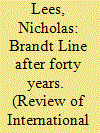

|
|
|
|
|
| Summary/Abstract |
The Brandt Line is a way of visualising the world that highlights the disparities and inequalities between the wealthy North and the poorer Global South. Forty years after its popularisation as part of a call for global reform, is the Brandt Line now a misleading way of representing world politics? This article assesses whether the Global South has lost its distinctiveness and coherence relative to the North since 1980. Existing assessments of global inequality do not settle the question of whether the North–South divide remains relevant for international relations because they overlook the most politically significant measures of inequality. Drawing on power transition theory, this article provides a systematic assessment of the North–South divide in terms of levels of economic development, relative inequality, economic power, and political satisfaction. The evidence suggests that the Brandt Line is largely intact. Although the economic diversity of the South has increased and its collective economic power has risen, relative income rankings remain unaltered and the states of the Global South are as dissatisfied as they were four decades ago. Differential growth rates are reshaping world politics without eroding the North–South divide traced by the Brandt Line.
|
|
|
|
|
|
|
|
|
|
|
|
|
|
|
|
| 2 |
ID:
115977
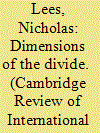

|
|
|
|
|
| Publication |
2012.
|
| Summary/Abstract |
Recent attempts at developing social-structural accounts of the international order have suggested that the international system might be analysed in terms of patterns of vertical differentiation and stratification. Taking up this challenge, this article argues that inequality should be understood as part of the 'deep structure' of the international system rather than in terms of the attributes of individual states. It suggests that we can understand how stratification and vertical differentiation emerge by examining five dimensions along which processes producing asymmetry occur, focusing on transactions between actors. These dimensions are: inter-state political hierarchy; secular socioeconomic development within societies; global stratification within the world economy; the dynamic of competitive development; and the process of overall collective management and supranational governance of the international system/global order. The historical intersection of these forms of stratification has produced an emergent, historically contingent division within the international order familiar to students of international politics as the North-South divide.
|
|
|
|
|
|
|
|
|
|
|
|
|
|
|
|
| 3 |
ID:
188701
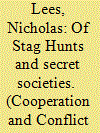

|
|
|
|
|
| Summary/Abstract |
In many circumstances where multiple, autonomous actors exist, cooperation is only a viable strategy if other actors also pursue a strategy of cooperation. Such situations can be characterised in terms of the Stag Hunt, based on a parable told by Rousseau. Although traditionally interpreted as a device for understanding how mutually beneficial cooperation can emerge, Harrison Wagner points out that would-be exploiters must overcome similar problems to succeed at subjugating others. Successful cooperation may have the ironic consequence of enabling deeper conflict within and between a multiplicity of societies. Despite its canonical status, the importance of the Stag Hunt for understanding the interaction between multiple societies may have been underestimated.
Nonetheless, rational choice theory alone cannot explain how cooperation-for-predation became established, while historical sociology’s conventional ‘materialist metanarrative’ of the origin of war and the state may have unduly neglected the role of gender relations. The phenomenon of men’s secret societies, found in many stateless societies, indicates that fraternal solidarity within coalitions of men competing to control women’s labour and bodies may provide a path to the nucleation of warlike states. If this is correct, it becomes clear that in many societies, men and women experience multiplicity in qualitatively different ways.
|
|
|
|
|
|
|
|
|
|
|
|
|
|
|
|
| 4 |
ID:
123584


|
|
|
|
|
| Publication |
2013.
|
| Summary/Abstract |
This article employs the neo-Ricardian concept of quasi-rents - temporary above-market returns - to vindicate the structuralist claim that patterns of international order are shaped by global inequality and the transnational division of labour. Developing a framework linking the distribution of quasi-rents within the global economy to the process of class formation, the article examines the implications for the influential 'social market democracy' explanation of the democratic peace. It argues that the democratic peace is in part predicated on the quasi-rents enjoyed by substantial sections of the workforces of the 'core' advanced industrial states. Such a political economy provides the foundations for a 'social market democracy' in which economic security can be enjoyed by substantial sections of the population, giving rise to the system of values on which the democratic peace rests. Thus, present patterns of international order result from a historically specific unequal distribution of quasi-rents within the world economy.
|
|
|
|
|
|
|
|
|
|
|
|
|
|
|
|
| 5 |
ID:
193102
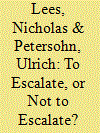

|
|
|
|
|
| Summary/Abstract |
The existing literature is unclear about whether private military and security companies (PMSCs) are a cause of increased conflict severity, or rather are simply hired within more severe conflicts. We argue that PMSCs do increase conflict severity, yet this is the result of an escalation strategy by states to regain territory from rebels. If contracted, PMSCs either substitute for host nation forces, or free up such conventional forces to engage in offensive operations. In both cases the conflict severity increases substantially. This argument is tested with OLS regression using data from 30 weak states from 1990 to 2007.
|
|
|
|
|
|
|
|
|
|
|
|
|
|
|
|
| 6 |
ID:
177731
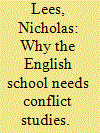

|
|
|
|
|
| Summary/Abstract |
The English School tradition offers a compelling framework for understanding war as an institution within an international society constructed by states. Nonetheless, analyses of the causes of inter-state insecurity offered by English School scholars are underspecified and fail to develop distinct middle-range theories based on these core insights. These problems can be remedied through an engagement with the subfield of quantitative conflict studies. This pairing of ‘scientific’ and ‘classical’ research traditions seems improbable, but the methodological barriers to conversation can be overcome if claims about the circumstances and causes of war are contextualised historically. Important findings in conflict research vindicate the English School understanding of war as a social institution of an anarchical society and a norm-governed mechanism for resolving disputes between political entities. Further dialogue between these approaches would deepen our understanding of how the global institutional landscape shapes both war and peace.
|
|
|
|
|
|
|
|
|
|
|
|
|
|
|
|
|
|
|
|
|